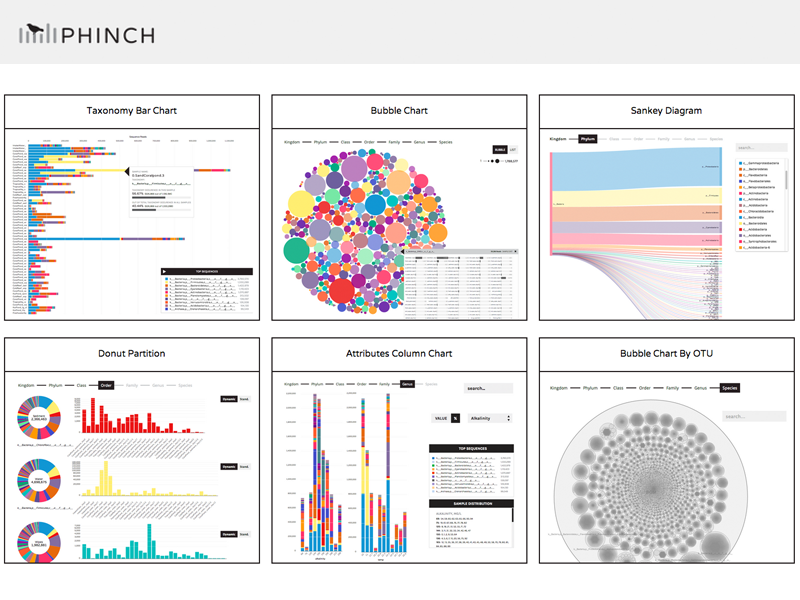🐦 Phinch 2.0 is launching as a desktop app for macOS, Windows, and Linux on May 10th!
🔬 New features include support for HDF5 and JSON BIOM files, retooled visualizations, improved image export and sharing, and the ability to work offline.
Phinch is an open-source framework for visualizing biological data, funded by a grant from the Alfred P. Sloan foundation. This project represents an interdisciplinary collaboration between Pitch Interactive, a data visualization studio in Oakland, CA, and biological researchers at UC Davis. Whether it's genes, proteins, or microbial species, Phinch provides an interactive visualization tool that allows users to explore and manipulate large biological datasets.
Phinch is optimized for use in the Chrome browser. It currently supports downstream analyses of .biom files (Biological Observation Matrix, a JSON-formatted file type typically used to represent marker gene OTUs or metagenomic data). All sample metadata and taxonomy/ontology information MUST be embedded in the .biom file before being uploaded.
Phinch supports both "sparse" and "dense" BIOM formats (although sparse .biom files are highly recommended, since the file size is much smaller). In QIIME, users can prepare the .biom file by executing the following commands:
make_otu_table.py -i final_otu_map_mc2.txt -o otu_table_mc2_w_tax.biom -t rep_set_tax_assignments.txtSecond, add your sample metadata to your .biom file. Where your input file (-i) is your OTU Map (defining clusters of raw sequences reads), taxonomy file (-t) contains the taxonomy or gene ontology strings that correspond to each OTU, and mapping file (-m) is a tab-delimited file containing sample metadata (instructions).
biom add-metadata -i otu_table_mc2_w_tax.biom -o otu_table_mc2_w_tax_and_metadata.biom -m sample_metadata_mapping_file.txtCurrently Phinch works with BIOM file type 1.0, which is formatted as JSON. If you're using QIIME 1.9 or newer, it will produce BIOM file type 2.1, which is formatted as HDF5. The following command, availible with the biom-format package will create a new JSON-formatted BIOM file from a HDF5-formatted BIOM file:
biom convert -i otu_table.biom -o otu_table_json.biom --table-type="OTU table" --to-json
Phinch is written in CoffeeScript (http://coffeescript.org/), a programming language that compiles into JavaScript. To install Phinch locally, you will need to install CoffeeScript and compile the code, as follows:
# install CoffeeScript
sudo npm install -g coffee-script@1.12.7
# cd to your local phinch folder
coffee -o scripts/ -cw src/
D3: http://d3js.org/
IndexedDB: http://aaronpowell.github.io/db.js/
FileSaver: https://github.com/eligrey/FileSaver.js/
Moment: http://momentjs.com/
jQuery: http://jquery.com/
jQueryUI: http://jqueryui.com/
jQueryFracs: http://larsjung.de/fracs/
Blob: https://github.com/eligrey/Blob.js/
DataTable: https://datatables.net/
JSZip: http://stuk.github.io/jszip/
Lo-Dash: http://lodash.com/
lz-string: https://github.com/pieroxy/lz-string
md5-js: https://github.com/wbond/md5-js
The BSD 2-Clause License
